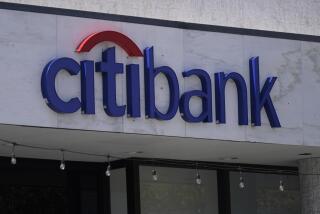Citigroup Ends Alliance With 3,622 Consumer Loan Brokers
- Share via
Citigroup Inc., the largest U.S. financial services company, has cut ties with more than 3,600 brokers who arranged loans for its Associates First Capital Corp. unit, a consumer finance company that has been accused of predatory lending practices.
The brokers, who weren’t employed by Citigroup, were dropped from the company’s list of approved agents for transgressions including not being properly licensed, failing to agree to a Citigroup ethics code and not bringing the company regular business, according to an internal memo sent to employees by Robert Willumstad, head of Citigroup’s consumer group.
The 3,622 brokers severed by the company include about 1,000 who were suspended in April, said spokeswoman Leah Johnson. The cuts represent about 64% of the brokers retained by Associates, which was one of the top four sub-prime mortgage lenders, according to Inside Mortgage Finance of Bethesda, Md. Sub-prime mortgages are for people who don’t qualify for standard loans.
Citigroup bought Associates last year for $27 billion.
Lenders such as Citigroup have been accused of charging hidden fees and levying high interest rates on sub-prime loans. The company has moved to diffuse criticism by cracking down on its loan brokers and ending some lending policies.
“Associates had gotten a reputation that their agents were not using the best business practices,” said Mark Bronzo, who helps manage $4.5 billion at Groupama Asset Management and owns Citigroup shares.
Predatory lending has been a hot-button issue in Washington. Senate Banking Committee Chairman Paul S. Sarbanes (D-Md.) held two days of hearings in July on the matter. He also called on the Federal Reserve Board and the Federal Trade Commission to increase enforcement under existing laws.
Predatory lending abuses involve loans with excessive or hidden fees, or mortgage refinancings that don’t benefit the consumer. Other predatory lending practices include high-pressure sales tactics and loans made without regard to a borrower’s ability to repay.
Sub-prime lending in general soared in the late 1990s. Now, an increasing number of borrowers are having trouble making payments as the economy sours.
Superior Bank of Chicago was seized by federal regulators in July, after losses on sub-prime home and car loans had depleted the thrift’s capital.
Before the Senate hearings, Citigroup and Household International Inc., the No. 2 U.S. sub-prime lender, scrapped use of single-premium credit life insurance, policies that were added to a mortgage’s principal and financed over the term of the loan. Consumer groups considered these insurance policies abusive because they inflated a mortgage’s cost.
About 35% of sub-prime borrowers are more than 55 years old and they are twice as likely to be African American as borrowers in the conventional market, according to research by Iowa Atty. Gen. Thomas Miller.
Citigroup stock fell 92 cents to close at $45.53 on the New York Stock Exchange.
More to Read
Inside the business of entertainment
The Wide Shot brings you news, analysis and insights on everything from streaming wars to production — and what it all means for the future.
You may occasionally receive promotional content from the Los Angeles Times.









